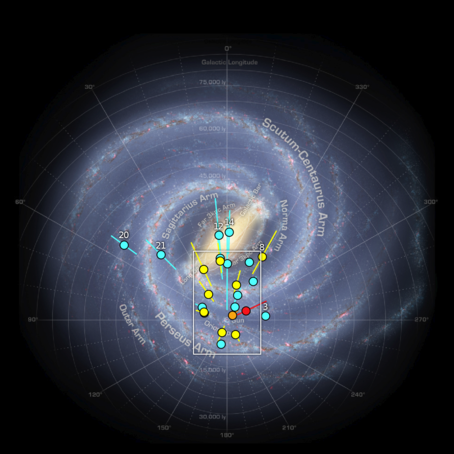BLACKCHAN PROJECT
Postdoctoral position now open for applications until 2021 Feb 17.
Application URL: https://jobs.soton.ac.uk/Vacancy.aspx?ref=1327321A3
We are looking to appoint a motivated postdoctoral researcher to join the BlackChan team to make breakthrough advances in understanding of black hole formation channels. This is a frontier topic of investigation, with close connections to time-domain astronomy and gravitational wave inferences - both at the forefront of current global research. The convergence of novel astrometric data from Gaia, large photometric surveys such as Chandra, WISE, eROSITA, PanSTARRS and many others, is paving the way to finding new black hole binaries in the Galaxy, validate sources that are interacting systems, and to map their phase space distributions.

Our team were the first to exploit Gaia data on dynamically confirmed black hole X-ray binaries (BHXBs) to map their distances and measure peculiar velocities of motion. We hope to take this work further to resolve the issue of whether natal kicks are momentum conserving or not. Our team have since led several further investigations on Gaia data of BHXBs, known or candidate systems, and in combination with other wide-area photometric surveys. This includes a detailed study of the Cygnus X-1 system and its progenitor cluster, identifying a correlation between height in the Galaxy and system orbital period, and a search for new candidate BHXBs showing orbital wobble and X-ray emission. We intend to expand these studies with upcoming Gaia data releases, and to leverage multiwavelength surveys such as eROSITA to validate the best candidates. Follow-up proposals are being submitted and observing time is available for spectroscopic confirmation and radial velocity studies. These observations will be used to constrain binary population models and should also allow new insight on natal-kick-dependent merger rates to be observed with LIGO/Virgo.
We are looking for postdoctoral researchers who are experts in their own fields and excited by the prospect of working in an interdisciplinary environment. Experience with data intensive coding will be considered positively. Due to the interdisciplinary nature of the research they will need good listening and communication skills. The duties will allow the researcher to propose research projects and take a leadership role of specific aspects, including publications. Funds for travel and staff development are available.
The successful candidate will be part of a large interdisciplinary team. This team is led by Prof. Poshak Gandhi at the University of Southampton. The other core investigator institutes include IoA Cambridge, Polish Academy of Sciences and Texas Tech Institute.
We work collaboratively with researchers in USA, South Africa, and Australia to exploit astrometric, photometric and spectroscopic surveys in a variety of novel ways.
Post Description:
The researcher who fills this post will be responsible for leading analysis on the BlackChan project. The aim is to use Gaia data in particular (along with other astrometry) to measure distances of current black hole accreting binaries (BHXBs) and estimate natal kicks associated with their formation. We wish to make fundamental advances in the question of whether natal kicks are momentum conserving or not. By mapping the phase space distribution of BHXBs in the Galaxy, we intend to shed light on their natal sites. In addition, higher order astrometric data such as astrometric excess noise may be used to identify new BH binary candidates, some of which can be confirmed using multiwavelength photometric surveys. Finally, some familiarity with theoretical models and implications, e.g. binary population synthesis models and LIGO/Virgo gravitational wave observations of binaries will be desirable.
They will work primarily with the project PI, but will collaborate with a team consisting of 3 academics, several PDRAs and PhD students. Collaboration with the Gaia mission team has been arranged, as has collaboration with the team developers of the StarTrack binary population code in Poland. The key requirements for this post demand a good broad understanding of, and interest in, observational astrophysics and black hole binary evolution in particular, a proven capacity to analyse and understand scientific problems, and a desire to learn new areas of science. We would not expect the successful applicant to have all the skills we would like on arrival and have considerable experience in teaching those skills. However we would expect the successful applicant to have skills in some of the following areas; coding for data intensive mining of astronomical databases; experience with TopCAT; experience with astrometric and photometry sky surveys; an interest in surveys such as eROSITA, Gaia and others; familiarity with binary population synthesis models and gravitational wave observations. This list is not exhaustive and we encourage applicants to present all their skills.
The researcher who fills this post will also have to have good people and organisational skills. This will include the ability to communicate their expertise to scientists in other fields and good listening skills to enable the flow of information the other way. They will be encouraged to develop leadership within the project, particularly in mentoring PhD students, and this may include. We are keen to work with ambitious people who wish to develop their careers. We are aware of the need for publications and other opportunities to enhance postdocs employability and have a history of providing an environment which leads to success in both industrial and academic research. We are keen to support people to apply for independent fellowships; this project is timely and allows ample opportunity for the researcher to develop. We are an equal opportunities employer and offer a range of benefits. Details can be found in the advert and associated links below, to be live in early Jan 2021.
Further Information
The post is available to start immediately. The contract will be for up to three years in the first instance, with expectations of follow-on funding to be applied for. Informal enquiries may be directed to Prof. Poshak Gandhi (poshak.gandhi@soton.ac.uk)
On-line applications via Southampton University Recruitment web site [see link above] -- accompanied by a C.V., a short statement of research experience and suitability to the position, along with at least 2 letters of reference.
Back to homepage

